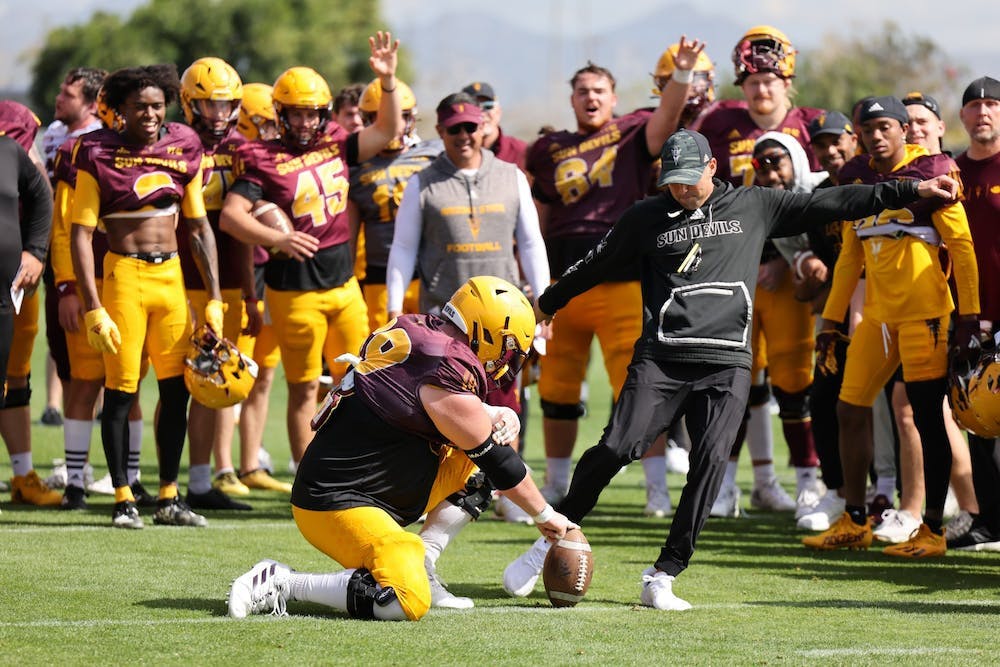ASU said their self-imposed postseason ban for the 2023-24 season was imposed to protect from potential losses of scholarships, hefty fines and recruiting opportunities that could result from an ongoing three-year NCAA investigation.
The postseason ban, which means the team will not be eligible for a bowl game regardless of how many games the team wins, was announced on Aug. 27 in a statement from Athletic Director Ray Anderson. The ban is imposed during an NCAA investigation into recruiting violations around COVID-19 restrictions under then-head coach Herm Edwards.
The ban comes down on first-year coach Kenny Dillingham, who said it will be a challenge to keep his players motivated during the season and was unhappy about the decision after a team practice on Aug. 27.
"It was upsetting," Dillingham said at the press conference.
Players also expressed frustration, including redshirt junior tight end Jalin Conyers, who said at the same practice on Aug. 27 that the team will carry their heads high into the regular season despite the disappointing decision.
"We all think we have a really good team that would have made a bowl game that you know could have exceeded expectations," Conyers said at the practice.
According to a statement from ASU, the timing of the ban had nothing to do with the transfer portal, which they said has been closed to undergraduate student-athletes since April of this year. The statement said they wanted to avoid a penalty from the NCAA similar to one that was imposed on the University of Tennessee football program in July 2023.
Tennessee's program committed "hundreds of violations" between September 2018 and November 2020 according to an NCAA Committee of Infractions' Public Infractions Decision in July 2023. These violations include direct cash payments to student-athletes and prospective student-athletes, paid recruiting visits during the COVID-19 dead period, and paid for hotel rooms, dining, entertainment and more for prospects visiting campus, according to the decision.
The penalties include an $8 million fine, which was negotiated between Tennessee and the NCAA Committee of Infractions. The fine replaces a postseason ban, which the COI said is because of Tennessee's "exemplary cooperation" with the prior investigation. The exemplary cooperation included Tennessee cleaning house by firing the then-head coach, athletic director and recruiting staff involved in the allegations.
The lack of a postseason ban for the Volunteers also falls in line with a new provision in the NCAA Constitution that states "penalties imposed for infractions do not punish programs or student-athletes not involved nor implicated in the infraction(s)."
However, there were heavy recruiting penalties on the Tennessee football program, including five years on probation with a reduction of 28 scholarships, with at least two scholarships a year. They also have to reduce the number of official visits, unofficial visits and recruiting communications significantly throughout the probation period.
ASU said the self-imposed postseason ban is designed to "pave the way for program stability and greater clarity going forward" because they said heavy recruiting penalties would "greatly impair" Dillingham's recruiting ability as head coach.
The NCAA investigation is still ongoing with no word on when it will wrap up. The Sun Devils open their season on Thursday night in Mountain America Stadium in Tempe against Southern Utah.
Edited by Alfred Smith III, Sadie Buggle and Caera Learmonth.
Reach the reporter at sbrenna5@asu.edu and follow @shanebrennan36 on X.
Like The State Press on Facebook and follow @statepress on X.

Shane Brennan is the former Editor-in-Chief at The State Press and an ASU alum. He was a sports and politics reporter, before becoming the editor of the politics desk. He has covered local and state politics for the Arizona Capitol Times and Cronkite News.




